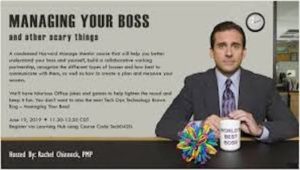Bits and Pieces
The Problem With Managers Managing Up

When you were the founder and CEO, you knew the organization inside and out. Now, half retired, what you know about the business comes through the CEO you hired when you bumped yourself upstairs.
He’s impressed you. You meet with him once a month. He’s prepared. He’s positive. And he gives you good news: Revenues are strong. Product development is progressing at a good pace. The company reputation on social media is strong. Employees are working hard and happy.
You are pleased. He’s really on top of things. You picked the right guy. You can relax a little.
A year later, the numbers aren’t as strong. Revenues are still high, but profits are dropping. New product development has slowed. Refunds are climbing. You ask questions. He has a good explanation for everything. Moreover, he has already put into place solutions that will get the business back on track. He is upbeat and confident. You want to believe him. So, you do.
Six months later, you look at the P&Ls and the balance sheet. Revenues are down. Profits are negative. Debt is up. And two key executives have quit. You know that he will have a good explanation for everything, and a plan to get back on track.
But it’s too late for that. You have a very serious problem on your hands. The trajectory of the business is downward. The momentum, once supporting growth, has reversed. You know you have to replace him and begin rebuilding again. But replace him with whom? Who can you get to come in and save the company now?
Some version of this has happened to me several times in my career. And every time it happened, I wondered, “How did I not see this coming?”
The answer is that I did see it coming. But I chose to ignore it. Because:
* The CEO had a superpower I wasn’t aware of when I hired him: He was superbly good at managing me – my beliefs, my expectations, and my hopes.
* As a passive participant in the business, I wanted to believe him. Disbelieving him would have meant making some tough decisions and getting active again.
Lessons learned:
When a CEO always has a “good” explanation for every problem that arises and an inordinately positive expectation of solving it, be suspicious. Real-life business doesn’t work that way. Remember when you were the CEO? Do you remember how often you were distressed about problems and uncertain about how to fix them? That’s reality.
The reason CEOs report to boards is not just to report the numbers, but to seek guidance when needed. When a CEO knows exactly what to do in every situation, you should assume he is bluffing and resist the temptation to believe him.
You should never, ever micromanage a CEO. But when the numbers are wrong and the excuses are glib, you should definitely get actively involved. Accept that as your duty, as a board member, to the business.
Be cognizant of your unconscious motivation to believe easy explanations and satisfying promises. It could be that you simply don’t want to get back into the trenches. Don’t chastise yourself for that. It’s normal. But know this: The moment you do get active again, you will be energized. You will know that you are doing the right thing. For yourself and for the business.
Interesting: How Blood Pressure Works

Paulo, one of my trainers, takes my blood pressure before and after each workout. He knows a lot more about health than I do. And he seems to think it’s important. He’s done his best to educate me. But between his accent (Portuguese) and my dimming brain, I’ve not made much progress in comprehending what, exactly, this measurement measures.
I came across this short video yesterday. I found it to be a good and helpful introduction…
The Digital Dollar: Step One

On Jan. 19, the Federal Reserve announced that it was “opening a review to determine the feasibility of having a US digital dollar.”
Chairman Jerome Power said the Fed was “looking forward to engaging with the public, elected representatives, and a broad range of stakeholders… to examine the positives and negatives of a central bank digital currency in the United States.”
I predicted this would happen in the June 28, 2021 issue. But I didn’t think the effort would begin this quickly. I suggested that the government would make its move gradually. Like this:
Step 1. It would quietly encourage the use of digital currencies, particularly those introduced by Google, Amazon, Apple, and other big government allies.
Step 2. It would introduce the digital dollar, with little or no fanfare to avoid scrutiny.
Step 3. It would subordinate the Big Tech currencies to the digital dollar, also as discreetly as possible.
Step 4. It would begin a national campaign (supported by Big Tech) against Bitcoin and other cryptocurrencies as vehicles for crime.
Step 5. It would outlaw cryptocurrencies and offer free exchange for the digital dollar (or any of its subordinate, Big Tech equivalencies).
Step 6. It would go after those that did not surrender their cryptocurrencies.
At that point, I said, the digital dollar would have taken over, and the government (and Big Tech) would have full financial control of its citizens.
Stay tuned…
Great Places to Visit: Going-to-the-Sun Road, Montana

Going-to-the-Sun Road, in Montana’s Glacier National Park, is reportedly one of the most breathtaking drives in the country. The road opened in 1933, though the stretch wasn’t fully paved until 1952. Going-to-the-Sun Road is a feat of modern engineering. Built at high elevation and along sheer cliffs, it stretches for 50 narrow, winding miles, among the park’s best scenic overlooks. Visit in summer. The road is 0ff-limits to tourists in winter due to snow and ice.
Click here.
Readers Write… “You are wrong about New York!”
KK wrote to “take umbrage” with my characterization of New York in the Jan. 12 issue as a dangerous sh*thole.
Re taxpayers fleeing:
* What I said – “From 2012 to 2018, 200,000 left the city. In 2021, 300,000 fled, most of them high-income earners.”
* What he said – As a percentage (3.5%), these numbers are “statistically insignificant.”
Re businesses lost:
* What I said – “New York has also lost many big and vibrant businesses due to higher taxes and soaring crime. And it has lost hundreds of restaurants and retail stores due to the COVID lockdown.”
* What he said – “I can assure you there is no problem finding a great place to eat or shop. Many of the closed restaurants will be missed only by office workers who are not here anyway.”
Re the city’s infrastructure and sanitation:
* What I said – “New York has become the dirtiest city in the country. Its infrastructure is crumbling. Its sanitation is Third World.”
* What he said – “I watch the garbage/recycling being hauled away twice a week as well as the streets being swept. Unless they have changed the definition of ‘Third World,’ this is utterly false. NYC is cleanest it has been in the six years I have lived here.”
Re the increase in violent crime:
* What I said – “Murders are up 50%. Rapes are up 25%. Even my wokest friends, loyal denizens of the city, feel it’s unsafe to take a walk at night.”
* What he said – “I personally know only one person who has been mugged recently.” Then he showed me a study that indicated that violent crimes are a tad higher in my hometown of Delray Beach (at 6.82 per 1,000) than in NYC (at 5.8).
I wanted to put in the time to refute KK’s refutation and further strengthen my case, but I’m busy in LA (another sh*thole) with family, so I’m going to have to wing it here. This is my response…
Re taxpayers fleeing:
3.5% is significant. Keep that up for five years and you are at a loss of 1.5 million state income taxpayers, amounting to a tax base of nearly $300 billion. (At NYC’s median income of $190,000.)
Re businesses lost:
As far as smaller businesses are concerned, KK is right. The pandemic not only caused record-level closures of small businesses, but also record-breaking starts. So long as NYC’s economy is in recovery mode, shuttered restaurants and other retail businesses will be replaced. But for its economy to recover and stay strong, the city needs to be a center for big finance and big business. And now that the corporate world has learned that it can do business from just about anywhere, why would they stay in super-high tax and high cost locations like NYC?
Re the city’s infrastructure and sanitation:
I haven’t been in NYC for more than a year. KK lives there. Point to him.
Re the increase in violent crime:
If you live in an affluent neighborhood anywhere in the world, you won’t notice a rise in murders and other violent crimes. That’s because 90% of them happen in “inner city” neighborhoods. KK lives in an affluent NYC neighborhood.
As for violent crime in Delray Beach… I was shocked to see the data. It’s hard to believe. But, I live in an affluent neighborhood. So, like KK, I couldn’t know that I live in a sh*thole too!
Worth Quoting
* “Things are beautiful if you love them.” – Jean Anouilh
* “The person who gets one shot needs everything to go right. The person who gets 1,000 shots is going to score at some point. Find a way to play the game that ensures you get a lot of shots.” – James Clear
* “The secret to having lasting personal relationships with friends and family is to assume that in the most fundamental and important ways they will not improve themselves.” – Michael Masterson
 MarkFord
MarkFord